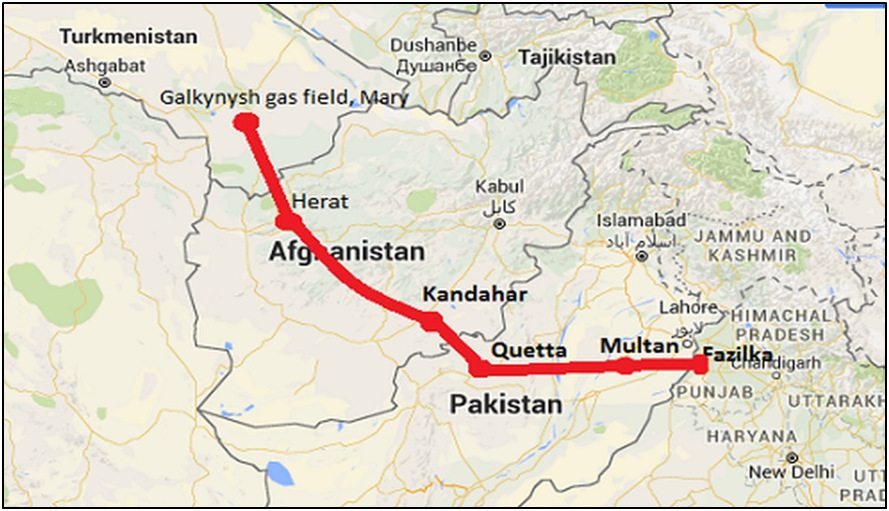In News:
- President Kovind is on a State visit to Turkmenistan from 1-4 April 2022.
- This is the first-ever visit of the President of India to independent Turkmenistan.
What’s in Today’s Article:
- Background
- Highlights of the visit
- TAPI Project (about, route, financing, timelines, reasons for delay)
Background:
- This visit comes at a time when:
- India is celebrating 75 years of Indian independence
- Turkmenistan is celebrating 30 years of its independence
- Together both India and Turkmenistan marked 30 years of the establishment of diplomatic relations.
Key Highlights of the visit
- List of MoUs signed/exchanged
- MoU between Financial Monitoring Service at both the countries
- MoU on Cooperation in the field of Disaster Management
- Programme of Cooperation in the fields of Culture and Arts for the period 2022-2025
- MoU on Cooperation in Youth Matters
- Commemorative Postal stamp released
- India-Turkmenistan commemorative Postal stamp, celebrating the 30th anniversary of establishment of Diplomatic Relations was released.
- Need to increase bilateral trade and economic cooperation
- The leaders noted that the bilateral trade between two countries which currently stands at less than US $100 million is not living up to its potential.
- They noted the role of the
- India-Turkmenistan Intergovernmental Joint Commission on Trade,
- Economic, Scientific and Technical Cooperation as a coordinating body for enhancing cooperation in this regard.
- Cooperation in the energy sector
- Cooperation in the energy sector was one of the key areas of discussion.
- The Turkmen side highlighted the benefits of the TAPI gas pipeline project for the economic development of the region.
- It agreed to examine India’s proposals of ensuring integrity, safety and security of the project.
In Focus: Turkmenistan-Afghanistan-Pakistan-India (TAPI) gas pipeline project
About

- The Turkmenistan-Afghanistan-Pakistan-India Natural Gas Pipeline (TAPI) Project is a proposed 1,814km trans-country natural gas pipeline running across four countries.
- This pipeline is also known as “Peace Pipeline”.
- These countries are – Turkmenistan, Afghanistan, Pakistan and India.
- The project aims to export up to 33 billion cubic meters (bcm) of natural gas per year.
- Of this, 5 billion cubic metres will be provided to Afghanistan and 14 billion cubic metres to each Pakistan and India.
Route
- The pipeline will transport natural gas from the Galkynysh Gas Field in Turkmenistan through Afghanistan into Pakistan and then to India.
- The pipeline will enter India through the Indian town of Fazilka (near the Indo-Pak border).
Financing
- The TAPI project is being funded by the Asian Development Bank (ADB), which is also acting as transaction adviser for the development.
- In April 2016, India along with other shareholders of the project signed an investment agreement with the Asian Development Bank.
- Under this, an initial budget of $200 million was earmarked to fund one of the phases of the project.
TAPI pipeline development: timeline
- The project was originally conceived in the 1990s and an inter-governmental agreement was signed in 2010 by the heads of four member nations.
- A Gas Pipeline Framework Agreement was signed in December 2010 and bilateral gas sale agreement was signed in May 2013.
- In February 2018, ground-breaking ceremony for Afghanistan's section of TAPI gas pipeline was held in the western Afghan city of Herat.
Reasons for the delay
- Tensions between India and Pakistan
- Many analysts believe that the $10 billion project failed to make any progress since it was conceived mainly due to tensions between India and Pakistan.
- One of India’s primary concerns is that once the project becomes operational, a lot of Indian industries will become dependent on it.
- Pakistan can take advantage of this and can shut off supplies during periods of tension.
- Concerns over the safety and security around the project
- The concerns over the safety and security around the project have grown manifold with the return of the Taliban in Afghanistan.
- New Delhi doesn’t officially recognise the Taliban regime in Afghanistan, which is one of the stakeholders of the project.
- This will make it difficult for India to move ahead with this project.
- Role of Asian Development Bank (ADB)
- The main impediment in the TAPI project is the ADB pausing the due diligence and processing activities until the Taliban regime is recognised by the UN.









